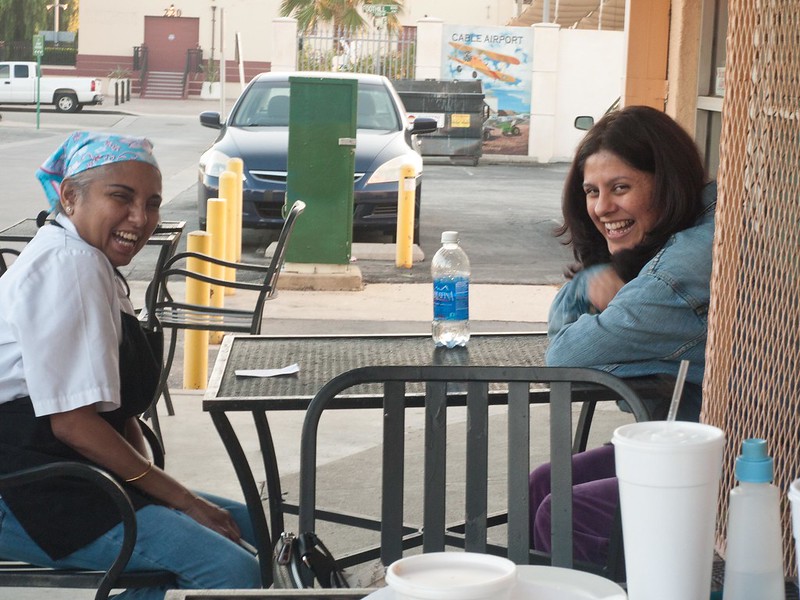Vermont Creek
Discovering the wonders of HDR.
Belmont General Store
Twain loved knits!
Shamrock & Walnut
We used to stumble into this ancient gas station (which is not still pumping gas) every once in a while. It never entered my mind that we would end up living down the street from it.
LA Cloud
Monrovia McDonald's
Huntington and Myrtle
Monrovia
Yosemite, of course
Deli V
We just learned that our close friend, Visa Lam, the owner and chef of Deli V in Upland, passed away. Hundreds of other people, I'm sure, have uttered those same words during the past month. She was that kind of person with all of her customers.
Deli V was the first pure restaurant discovery of ours (as opposed to places we tried on Alan Borgen's recommendation) when arriving in Rancho Cucamonga 6+ years ago. My wife was struck by its name in a newspaper restaurant listing. We almost gave up looking for it, so hidden it was from the main street in Upland.
Thankfully we did find it, for Deli V served some of the best panini's, the best cookies, the best brownies, the best soups, the best pies, and the best cake (and the best tuna melt, but that might be just me) in the Inland Empire.
And it had Visa. While she exuded love for her food, and wasn't shy about telling everyone how good it was. Unbridled affection for her customers was her dominant trait. As far as we could tell (to be fair, we never actually went to Deli V during peak times, so it was never particularly crowded while we were there), Visa visited every customer personally. At least, every customer who wanted to became a friend.
Visa was the kind of person who would inspire regulars to arrive, totally unbidden, to plant and maintain the planters in front of the restaurant (we were there once when a couple of regulars started on the task, and I kicked myself for not thinking of it myself).
She was the kind of person who took pride in her perfect health inspection scores. Not just good enough to get A's with a handful of checkmarks for minor infractions, like almost every other restaurant in California. No, Visa had unblemished A's.
She was also the kind of person who would habitually send out samples of soups and desserts just because she was proud of them, thought we would like them, and wanted to see what we thought.
After trying one of her brownies, we decided to bring a half dozen with us on a trip to visit with my wife's family in Mexico (which I happily drove in from Pasadena on my lunch hour to pick up). Brownies (and other deserts) from Deli V became a staple of any time anyone in the family travelled from Los Angeles to Orizaba. Visa even catered most of our most recent Christmas dinner, which we brought with us to the family Christmas in Tijuana. (My nephew has already asked about the brownies for this summer's upcoming trip.)
Since moving to Pasadena several years ago, our Deli V visits were reduced to once a month, in conjunction with a couple of regular errands we run in the Inland Empire. Visiting with Visa was always the highlight for me, as we could easily spend two hours chatting (when she wasn't serving and chatting with others).
I'd give anything for just one more tuna melt.
Click here for a Flickr photo album of some of our trips to Deli V over the past years.
Shopping at Love's
At Johnnies in Culver City
As seen on Huell Howser's show.
The Last Lion: Winston Spencer Churchill: Defender of the Realm: 1940-1965
One of my best book purchases ever was Volume 1 of William Manchester's planned three volume Winston Churchill biography. It was on a remainder rack selling "books by the inch" for $1/inch. I figure Volume 1 added about $1.75 to my purchase.
After a long wait, Volume 3 is finally out, albeit, sadly, after a change of author as Manchester passed away during the process, writing duties taken over by Paul Reid.
It shows. About 25% into the narrative the book becomes little more than a list of activities with little overall storytelling. To be sure, this characteristic turns many biographies into a slog to the finish, but here more than most.
The book leaves the reader wondering what about Churchill did to make him so beloved, at least after the initial London blitz. This is a man who was offered a Dukedom because a mere knighthood didn’t seem generous enough, a man with his own monument in Westminster Abbey. Yet we are not given any feel whatsoever about why. Perhaps just being PM during the war was enough, but something made him the most important person of the first half century, and then the entire century. This book does not give a feeling for what that something was (again, at least after his spirited heroism during the initial blitz...the narrative of which might well have been written primarily by Manchester).
Immediately after V-E day Churchill was resoundingly and overwhelmingly swept from office. Why? Of course sensible hypotheses leap mind, but we read the book to learn what knowledgeable researchers conclude, not what we assume.
(Presumably) relatedly, early on in the war, after the death of Neville Chamberlain, Churchill accepted the Tory party leadership, even though he was PM of a bi-partisan wartime government. The book describes this as the worst political decision of his life, but doesn't even try to link it to anything. Presumably it played a crucial role in the disastrous 1945 elections. As to what that role was, the reader is left to his own prejudices.
Despite the above criticisms, I'm thrilled that this book was finally completed and released, even if a substitute author had to be brought in. The world would have been the worse without it.
Sebastian
A delightful piece of 1953 dropped into 2014 Ventura County.
That's Santa Paula, CA. It could easily be used by as the backdrop for an Andy Griffith remake (well, but for the 30% Spanish language signs filling downtown). There's even a department store the size of an urban McDonald's with a telescope in its front display.
I've always wanted to try out the Chili Hut, but we take Bo and the Hut has no outdoor seating, so we end up at the utterly out of place but wonderful cajun bistro that's up the street.
Good thing I only come here for Diet Pepsi
Does Economics have a conservative or liberal bias?
Chris House argues that Economics has a conservative bias:
"In economics it seems like the facts and the analysis have much more of a conservative slant than a liberal one. It really is true that taxing labor income reduces labor supply (a little). It really is true that extending unemployment benefits encourages people to delay looking for a job (a little). It really is true that taxation can reduce employment demand; that excessive business regulation seems to be correlated with reduced levels of business formation; that union concentration has a detrimental effect on industries and on and on. "
Matt Yglesias lists points that he believes imply that basic Economics has a liberal bias:
- Governments (typically through central banks) need to manage the demand level of national economies to prevent catastrophic recessions and mass unemployment.
- Absent carbon pricing, a market economy will massively overproduce greenhouse gases.
- Many industries, such as broadband Internet, are "natural monopolies" where an unregulated market will lead to higher prices and less investment than is socially optimal.
- Due to asymmetrical information, consumers in a market economy will be unable to bargain effectively with doctors and other providers of health care services.
- Due to adverse selection, consumers in a market economy will be unable to effectively insure themselves against health risks.
- Due to the declining marginal utility of money, taking $100 from a rich person and giving it to a poor one will increase human welfare.
- Increasing the number of immigrants, raising taxes on the rich, and making Social Security benefits more generous will make almost everyone better off.
I basically agree with both authors on every one of these observations (with caveats on a few*). Econ 101-type analysis does make almost every single one of these points.
But notice that House’s observations basically come from the trunk of Economics, which I take to be spinning out of the observation that voluntary transactions are mutually beneficial thereby creating the invisible hand that leads people to make the world a better place while trying to do nothing more than make themselves better off.
Yglesias’ points, for the most part, reflect conditions under which transactions mutually beneficial to the participants do not, for one reason or another, make the world better off (i.e., "market failures”). The points are all fine, if in some cases overwrought, but unless Matt wants to argue that they completely overwhelm the trunk of Economics, then Economics has a "conservative" bias.
I’m reminded of an interview with an urban planner of some sort who described letting all of the inhabitants of a city trade with each other however the want, put stores wherever they want, and so on, as “the worst possible thing to do.” Not something that can in some cases lead to some negative consequences that might be able to be addressed by some government policy, but, rather, “the worst possible thing to do.”
I can think of something worse. Giving a collection of urban planners carte blanche to dictate how and where individuals interact with each other without allowing for learning and adjustments on a micro level would be worse.
* A few observations about Yglesias' points:
- The basic Economics that I took did not teach that Governments need to manage demand. It did teach about theoretical Keynesian countercyclical policies that Governments could attempt to employ to reduce the scope of the business cycle. It did not necessarily give much hope that real flesh and blood governments would be able to implement these policies in a way that does more good than harm.
- Technically, Econ 101 assumes that interpersonal utility comparisons are impossible, so it cannot teach that a policy which reduces a rich person’s wealth by $100 while simultaneously increasing a poor person’s wealth by $100 necessarily increases human welfare. But it certainly suggests such a thing.
- For similar reasons, in no way does Econ 101 teach that raising taxes on the rich or making Social Security benefits more generous will make almost everyone better off. I honestly have no clue where Yglesias gets that idea, unless it is generalized from the $100 from rich to poor argument. In that case, at worst Econ 102 is going to get into disincentive effects of taxation and the fact that Social Security is fundamentally a transfer from the middle class to the middle class.
- Finally, we Austrian-types tend to view the world as a sea of ignorance surrounding little blobs of knowledge, and the Economic Problem as how to manage to bring these little blobs of knowledge to bear on decisions. In some sense, asymmetrical information is a characteristic of every transaction. Asymmetrical Information is interesting and worthy of study (more so that a lot of other things that get studied). But it’s hard to get as worked up about it as the left does.
OC Fair
Hot dogs and Fries
At the border
Border nurse


















